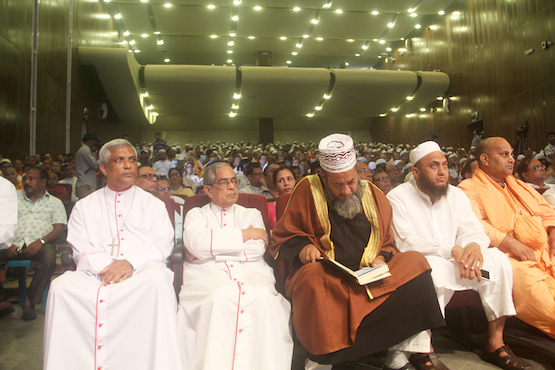Religious leaders vow to fight extremism with harmony
Leaders of four major religions have vowed to unite and promote religious harmony as part of efforts to combat a sharp rise in religious extremism and
May 03, 2016

DHAKA: Leaders of four major religions have vowed to unite and promote religious harmony as part of efforts to combat a sharp rise in religious extremism and militancy in Bangladesh.
The pledge came at an interfaith conference organized by Bangladesh police in Dhaka on April 28.
The gathering brought together about 1,500 people, mostly leaders from Muslim, Hindu, Christian and Buddhist communities.
The show of unity comes in the wake of a series of brutal attacks on liberal and progressive activists including secular bloggers, publishers, educators, and religious leaders allegedly by Islamic militants.
International terror groups such as the so-called Islamic State and al-Qaeda have claimed responsibility for the attacks, but the government insists the attacks were the work of homegrown militants allegedly linked to opposition and Islamist parties.
Home Minister Asaduzzaman Khan said there was a "conspiracy to destroy religious harmony" in Bangladesh.
"There are some homegrown militant groups who are trying to create anarchy. This is part of a conspiracy to destroy a long tradition of peace and religious harmony in Bangladesh," Khan told the April 28 gathering.
Leaders from various religious communities can play a vital role in uniting people against fundamentalism, he added.
Holy Cross Archbishop Patrick D'Rozario of Dhaka said interfaith dialogue and efforts to strengthen harmony are vital in battling religious extremism.
"We are passing through challenging times and we would like to overcome these challenges successfully," he said.
"We have inherited a thousand-year-old tradition of tolerance and harmony, so we should not let some unexpected incidents happen and destroy it," Archbishop D'Rozario said.
Prominent Islamic cleric Maolana Fariduddin Masoud said Islam doesn't endorse violence and that Bangladesh's Islamic leaders denounce violence in the name of religion.
"The courts are entrusted to judge people if they commit any offense, but some misguided people are using violence in the name of Islam. This is un-Islamic," said Masoud, head of Jamiatul Ulama, a liberal Islamic group.
Masoud's group is carrying out a signature campaign to collect signatures from 100,000 Islamic clerics to declare an anti-militancy fatwa (religious edict).
"So far we have collected 76,000 signatures from clerics and the rest would be collected soon," he said.
"Every religion calls for love, compassion and human dignity, and this sense of humanity needs to spread all over. This is how we can fight extremism and build a peaceful society," he added.
The rise of fundamentalism shows some weak points in the country's culture of harmony, which must be mended, according to Swami Dhruveshananda, a Hindu priest and principal of the Dhaka branch of the Ramakrishna Mission, an international Hindu organization.
"We must work … to diminish divisions to ensure equity and peace," the Hindu leader said.
Shuddhananda Mohathero, president of the Dhaka-based Buddha Kristi Prachar Sangha, a Buddhist religious and social organization, echoed the call.
"One who truly loves [his] country and religion can't resort to violent means. As religious leaders we must make strong efforts to educate faithful for peace and harmony, in order to denounce religious bigotry and hatred," the Buddhist monk said.--Ucannews.com







Total Comments:0